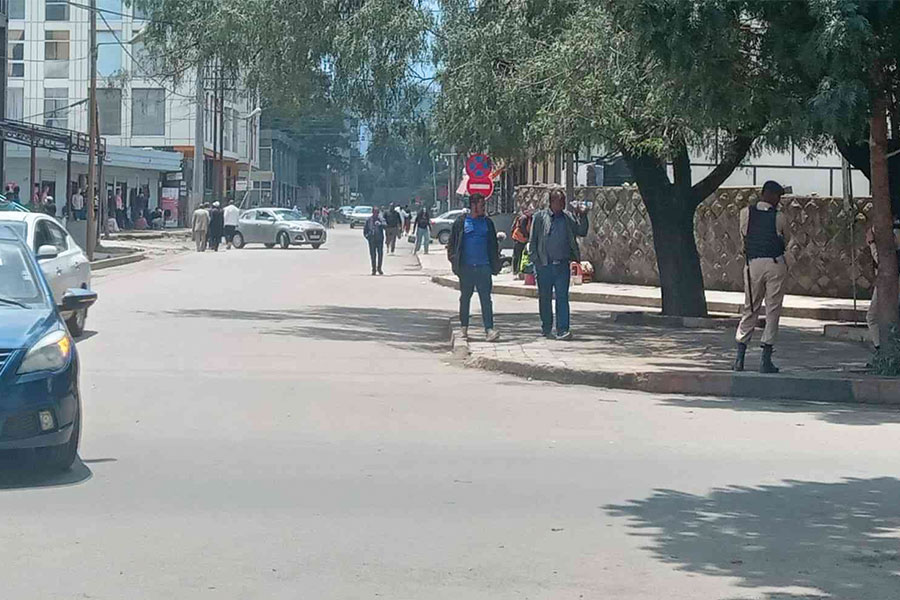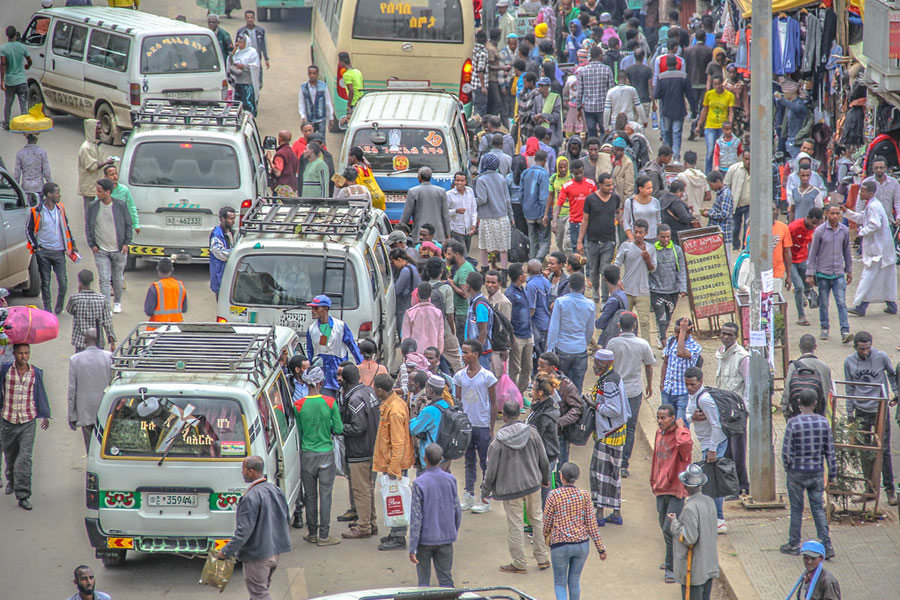
Agenda | Aug 10,2025
Oct 7 , 2023
By Erik Berglof
It is crucial to decarbonise the world to limit global warming to 1.5° Celsius. However, pressuring emerging economies to reach net-zero emissions too quickly could lead to an explosion of dollar-denominated debt and financial volatility across the developing world. Integrating these countries into the decarbonisation effort requires a more nuanced strategy.
Over the past year, policymakers and scholars, some from developing countries, have proposed solutions to this conundrum. As global leaders gather for the annual meetings of the International Monetary Fund (IMF) and the World Bank in Marrakesh this week, three proposals, in particular, merit serious debate.
While emerging and developing economies have contributed little to the climate crisis, their carbon dioxide emissions are increasing rapidly. To achieve the economic growth their citizens expect, stay within their carbon budgets, and shift away from fossil fuels, these countries must invest significantly in green technologies, primarily financed through international capital flows.
The United Nations Conference on Trade & Development's (UNCTAD) 2023 World Investment Report projects that developing countries require 1.7 trillion dollars in annual investments to achieve a green transition. In 2022, they secured only 544 billion dollars. Most of this financing is dollar-denominated, exacerbating the debt burdens of low-income countries struggling to service their obligations following the COVID-19 pandemic and Russia's full-scale invasion of Ukraine.
Relying on other foreign-currency funding seems just as impractical, given that most of these countries' revenues are in their local currencies.
The three proposals currently being discussed complement one another. The most well-known, the Bridgetown Initiative 2.0, has brought local currency financing to the forefront of the global policy debate.
The original Bridgetown Initiative - championed by Barbadian Prime Minister Mia Amor Mottley and her climate adviser, economist Avinash Persaud - focused on issuing special drawing rights (SDRs, the IMF's reserve asset). The updated proposal, however, urges the IMF and multilateral development banks (MDBs) to offer subsidised guarantees that account for mispriced currency risks, thereby reducing developing countries' borrowing costs.
The second proposal is to scale up and provide guarantees to the Amsterdam-based TCX, a risk-pooling mechanism designed to provide low-income countries with a cost-effective way to shield themselves from currency fluctuations. The third proposal encourages MDBs and bilateral development finance institutions to consolidate their liquidity requirements through an "onshore" platform that operates with local currencies.
Although these three proposals are tailored for different countries and economic contexts, with widely varying effects on the long-term evolution of local currencies and domestic capital markets, they could be scaled up. The Bridgetown Initiative, for example, focuses on large emitters within emerging and developing economies. This is crucial for keeping global temperatures below the 1.5°C threshold and could also be applied to many developed countries.
Similarly, though TCX primarily deals with smaller and more volatile currencies, the proposed onshore vehicle would be tailored for countries with sufficiently mature institutions. This group could be expanded to include larger and more developed economies, allowing for a wider array of hedging mechanisms.
The Bridgetown Initiative assumes a premium for hedging foreign exchange risk in emerging and developing economies. While the initiative's proponents have released a detailed empirical analysis that points to the existence of such a premium, its impact remains to be seen. Nevertheless, the overarching argument that investing in green technologies in these countries is much costlier than in advanced economies is undeniably persuasive.
The TCX strategy hinges on the lack of correlation between various currencies. Naturally, the more currencies TCX includes, the greater the pooling benefits. By contrast, the economic rationale for the onshore platform stems from the expected reduction in hedging costs when the intermediaries have access to local currencies. While the ability to expand this approach is still uncertain, there is potential for achieving economies of scale.
To avert a financial meltdown, the international community must assist emerging and developing countries manage massive capital inflows. All three proposals should be combined with renewed efforts to bolster local institutions and markets. Unlike the other two proposals, the onshore mechanism could advance this goal by partnering with central banks and commercial lenders.
The urgency and global salience of the climate crisis have created a unique opportunity to advance this agenda. Enhancing developing countries' ability to mobilise domestic savings and stabilise currency fluctuations would yield benefits far beyond the net-zero transition.
The proposed onshore mechanism, which would facilitate increased coordination among MDBs, aligns with the broader goal of streamlining the international financial system. Currently, credit-rating agencies penalise MDBs for lacking access to the same liquidity backstops as commercial banks. But, multilateral lenders could significantly increase their lending capacity by coordinating their liquidity management.
While the development of local currency and capital markets has been limited thus far, there is cause for hope. Recent shocks to the international system have affected emerging economies less severely than previous crises, indicating greater macroeconomic resilience.
Rising debt levels have raised fresh concerns, however, especially in the countries most vulnerable to climate change's effects. Enhancing these economies' resilience is crucial not just for the stability of the global financial system but also for sustaining the momentum of the fight against climate change.
PUBLISHED ON
Oct 07,2023 [ VOL
24 , NO
1223]


Agenda | Aug 10,2025

Editorial | Oct 21,2023

Commentaries | May 23,2020

Viewpoints | Jan 18,2020

View From Arada | Nov 26,2022

Viewpoints | Mar 09,2024

Viewpoints | Aug 10,2019

Fortune News | May 11,2024

Letter To Editor | Apr 18,2023

Viewpoints | Apr 22,2022

Photo Gallery | 178050 Views | May 06,2019

Photo Gallery | 168260 Views | Apr 26,2019

Photo Gallery | 159011 Views | Oct 06,2021

My Opinion | 137042 Views | Aug 14,2021
Commentaries | Oct 25,2025

Dec 22 , 2024 . By TIZITA SHEWAFERAW
Charged with transforming colossal state-owned enterprises into modern and competitiv...

Aug 18 , 2024 . By AKSAH ITALO
Although predictable Yonas Zerihun's job in the ride-hailing service is not immune to...

Jul 28 , 2024 . By TIZITA SHEWAFERAW
Unhabitual, perhaps too many, Samuel Gebreyohannes, 38, used to occasionally enjoy a couple of beers at breakfast. However, he recently swit...

Jul 13 , 2024 . By AKSAH ITALO
Investors who rely on tractors, trucks, and field vehicles for commuting, transporting commodities, and f...

Oct 25 , 2025
The regulatory machinery is on overdrive. In only two years, no fewer than 35 new pro...

Oct 18 , 2025
The political establishment, notably the ruling party and its top brass, has become p...

Oct 11 , 2025
Ladislas Farago, a roving Associated Press (AP) correspondent, arrived in Ethiopia in...

Oct 4 , 2025
Eyob Tekalegn (PhD) had been in the Governor's chair for only weeks when, on Septembe...

Oct 25 , 2025 . By YITBAREK GETACHEW
Officials of the Addis Abeba's Education Bureau have embarked on an ambitious experim...

Oct 26 , 2025 . By YITBAREK GETACHEW
The federal government is making a landmark shift in its investment incentive regime...

Oct 27 , 2025
The National Bank of Ethiopia (NBE) is preparing to issue a directive that will funda...

Oct 26 , 2025 . By SURAFEL MULUGETA
A community of booksellers shadowing the Ethiopian National Theatre has been jolted b...